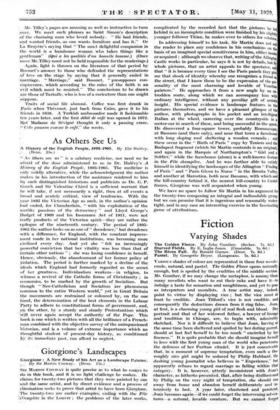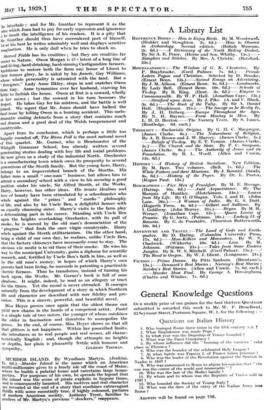Fiction
Varying Shades
VARIOUS shades of colour are represented in these four novels: crude, natural, and pastel. The Golden Fleece opens naturally enough, but is spoiled by the crudities of the middle section. Mr. Gunther, if we may change the metaphor, is among those many novelists who want to eat their bake and have it—to indulge a taste for sensation and naughtiness, and yet to pose as interpreters and moralists. A true artist may, indeed, point to virtue by displaying vice ; but the vice must at least be credible. Joan Tilford's vice is not credible, and consequently the deductions drawn from it ring false. Joan, at first, is a charming young girl of real flesh and blood. Her portrait and that of her widowed father, a lawyer of lineage and tradition in Chicago, are, to begin with, admirably sketched. Nor is it difficult to believe that Joan, having at the same time been sheltered and spoiled by her doting parent,
should at last feel herself to be too much " encircled by her fineness." It is quite probable that she should imagine herself in love with the first young man of the world who penetrates the defences of her Puritan citadel. It is just conceivabk that, In a moment- of supreme temptation, even such a tho-
roughly nice girl might be seduced by Philip Hubbard, the dashing young journalist who believes in " Experience," but apparently refuses to regard marriage as falling within Oat category. It is, however, utterly inconsistent with Joan's tharacter, as hitherto presented:that, after being disillusioned by Philip on the very 'night of temptation, she should run away from home and abandon herself deliberately and in- tensively to lust. A year later, chastened and penitent, 'Join becomes again-Lif we could forget the intervening adven- tures—a natural, lovable creature. But we cannot forget
he interlude ; and for Mr. Gunther to represent it as the nice which Joan had to pay for early repression and ignorance s to insult the intelligence of his readers. It is a pity that gr. Gunther should thus have surrendered part of himself, 'or at his best he writes admirably well and displays sensitive magination. He is only dull when he tries to shock us.
Starved Fields has its crudities ; but they are crudities far wirer to Nature. Owen Morgan is th-e latest of a long line of wd4feing, hard-drinking, hard-sinning Cardiganshire farmers. Ambitious to restore both the farm and house of Lluest to their former glory, he is aided by his fiancee: Gay Williams, whose whole personality is saturated with the land. But a foreigner," Lady Anne Ilkley, steps in and snatches Owen from Gay. Anne tyrannizes over her husband, starving his fields to furbish the house. Owen at first is a coward, wholly at her mercy ; but the coward in his turn becomes the despot. He takes Gay for his mistress, and the battle is well joined. We regret that Mr. Jones should have balked the final issue by killing Owen in a hunting accident. This melo- dramatic ending detracts from a story that contains much real drama and a good deal of the Welsh temperament and countryside.
Apart from its conclusion, which is perhaps a little too happily rounded off, The Riven Pall is the most natural novel of this quartet. Mr. Gurner, who is Headmaster of the Whitgift Grammar School, has already written several penetrating stories dealing with boy life and social problems. He now gives us a study of the industrial North. Orechester is a manufacturing town which owes its prosperity to several generations of the Storth family. But the young hero, Harry, belongs to an impoverished branch of the Storths. His father runs a small " one-man " business, but allows him to attend a secondary" school with a view to his securing a good position under his uncle, Sir Alfred Storth, at the Works. Harry, however, has other ideas. His innate idealism and love of beauty have been stimulated by a schoolmaster who rebels against the " prizes " and " marks " philosophy of life, and also by his Uncle Ben, a delightful farmer with an equally charming sister. Harry's visits to the farm play a determining part in his career. Standing with Uncle Ben upon the heights overlooking Orechester, with its pall of smoke, he is moved by the old man's denunciation of the " progress " that fouls the once virgin countryside. Harry rebels against the Storth utilitarianism. On the other hand, being a child of our own day, he realizes, unlike Uncle Ben, that the factory chimneys have necessarily come to stay. The obvious via media is to rid them of their smoke. He wins his way to the municipal University, gains a diploma for scientific research, and, fortified by Uncle Ben's faith in him, as well as by the old man's money, in hopes of which Harry's own parents had been living, he succeeds in patenting a practicable electric furnace. Thus he transforms, instead of turning his back upon, the Works. Mr. Gurner's book is full of sane idealism. It might, indeed, be read as an allegory or tract for the times. Yet the moral is never obtruded. It emerges naturally from the development of a story in which Northern life and character are described with rare fidelity and pre- eision. This is a sincere, powerful, and beautiful novel. Miss Heyer proves once again that the oldest theme can yield new charm in the hands of a competent artist. Pastel is a simple tale of two sisters, the younger of whom outshines the older in fascination and threatens to monopolize the prizes. In the end, of course, Miss Heyer shows us that all that glitters is not happiness. Within her prescribed limits, she introduces us to real people and real scenes, all charac- teristically English ; and, though she attempts no heights or depths, her plain is pleasantly fertile with humour and











































 Previous page
Previous page